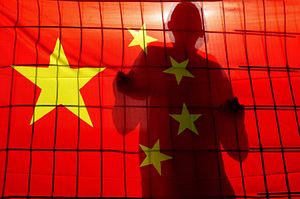It’s mid-April, so that means it’s time once again for the most ritualistic clash in U.S.-China relations: the dueling human rights reports.
Every year, the U.S. State Department issues a report on human rights in other countries around the world. The Country Reports on Human Rights Practices have been an annual tradition since 1977; unsurprisingly, China has been repeatedly dinged for human rights violations ranging from restraints on freedom of expression to illegal detentions and extrajudicial murders.
Beijing invariably responds by accusing Washington of having ulterior, political motives. As Foreign Ministry spokesperson Lu Kang put it on Thursday:
It is nothing new to us that the so-called U.S. annual report on human rights points fingers at other countries’ internal affairs in the name of human rights. The section about China politicizes the human rights issue and plots to undermine China’s stability and development while turning a blind eye to China’s achievement in promoting human rights.
In retaliation, China began issuing its own report on human rights in the United States in 1998. Its release is timed to coincide with the release of the U.S. report.
This year, the State Department’s report on China warned (as many human rights advocates have pointed out) that “repression and coercion markedly increased during the year against organizations and individuals involved in civil and political rights advocacy and public interest and ethnic minority issues.” The report described the crackdown on lawyers as “particularly severe,” noting that “hundreds of lawyers and law associates [were] interrogated, investigated, and in many cases detained in secret locations for months without charges or access to attorneys or family members.”
The report also noted the disappearance of five Hong Kong residents (including one Swedish and one British citizen), along with rumors the men had been detained by Chinese authorities for their connections to a publishing house that specializes in salacious rumors about Chinese leaders. The men were later all confirmed to be in China, though authorities claimed all had gone there voluntarily to help with investigations on several unrelated charges.
Then there were the usual complaints about China’s restriction of free speech (particularly online) and a free press; constraints on religious practices, from Christian churches in Zhejiang to Muslim mosques in Xinjiang; and the widespread use of torture and forced confessions in the legal system.
China’s report, meanwhile, bluntly concludes that the U.S. human rights records is “terrible.”
“Since the U.S. government refuses to hold up a mirror to look at itself, it has to be done with other people’s help,” the report adds.
In particular, the report notes excessive gun violence and police violence. “The use of guns was out of control in the United States,” it says, while also pointing out “excessive violence” and “abuse of power by the police.” (Ironically, the U.S. report also dings China for this, reporting an incident in China where a petitioner was shot dead by police.) The report also points out racial tensions in the United States, categorizing race relations as “at their worst in nearly two decades.”
However, China’s report spends a great deal of time tackling economic issues, which in its categorization are human rights issues. Statistics on U.S. poverty, homelessness, and lack of health insurance all made it into China’s report. The U.S. report on China, by contrast, did not mention economic well-being except to note that certain groups (such as the disabled) were particularly prone to poverty in China. China also used crime statistics – including the number of robberies – as a black mark against the United States.
This may seem odd to Americans, but China’s official definition of human rights has long been focused on economic well-being – the “people’s livelihood,” as Chinese officials call it. Economic stability, after all, has been the primary offering from Beijing to Chinese citizens for the past 30 years. Chinese officials point to their incredible economic success story, which has lifted 800 million people of out poverty according to the World Bank, as their primary contribution to human rights. In March, a Xinhua article complained of the West’s “selective amnesia” on human rights, arguing that “one of the greatest human rights successes a country could hope for is the elimination of poverty.”
China’s leaders have long since decided – on behalf of every Chinese citizen – that the definition of human rights delineated in the U.S. State Department report is not suitable for their country. The concept of “universal values” – specifically, the idea that all people around the world are entitled to certain rights – was rejected as a threat to Party authority in the infamous Document 9. “The goal [of championing universal values] is to obscure the essential differences between the West’s value system and the value system we advocate,” the document warns.
The idea of a free press, for example, is anathema to a leader like Xi Jinping, who believes the proper role for the media is to “love the party, protect the party, and closely align themselves with the party leadership in thought, politics and action.” Likewise, Beijing values protecting its citizens from “rumors” and misleading information – particularly about the government – over freedom of speech. Even the justice system is assumed to be loyal first and foremost to the Party, not to the law. As for democracy, China already has that in spades — didn’t you know?
Instead, the Party has promoted its own set of values, the “core socialist values,” which lists “prosperity” – economic wealth – first and foremost. But it will have a hard time convincing the United States to judge its human rights record according to its own definition.

































